Media Praxis Theory in the 2nd funding period
The Lecture and Workshop Series Media Practice Theory is part of the Collaborative Research Center (SFB 1187) Media of Cooperation since launching in 2016. The aim of the series is to develop a theory of digital praxeology. The series combines evening lectures by international scholars followed by workshops featuring specific texts proved by our guests. We have about 3-4 lectures / workshops each semester as a part of our integrated graduate school MGK.
The Lecture and Workshop Series was developed during the first funding phase of the SFB (2016-2019) and back then called only Practice Theory. It has established a central discussion forum about practice-theoretical approaches. The overall objective was to develop new perspectives on media history and media analysis. It is giving primacy to “practice” while focussing on processes of media production and work. We set out exploring media practices related to “coordination”, “delegation”, “registration & identification”, both with regard to a sound empirical foundation and to theoretical reflection. These methodological foundations and reflections lead into setting up the new subprojects P02 Media of Praxeology II: History of audio-visual sequence analysis as a methodology and P03 Media of Praxeology III: Digital Tools and Environments for Research Medien for the second funding phase.
Talks in the winter term 2023/24
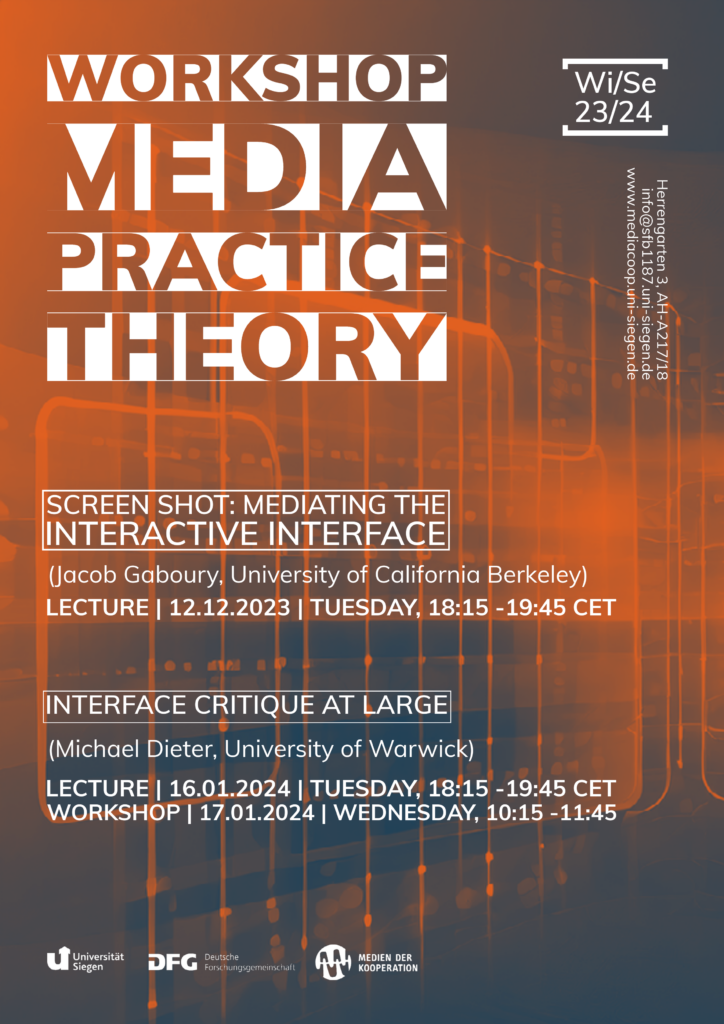
Lecture on 12th December 2023- „Screens Shot: Mediating the Interactive Interface“
This talk will examine the history of the digital screenshot from its origins in computer graphics labs in the 1960s to contemporary methods for digital archiving and preservation, asking what this history tells us about the materiality of the digital and the ways in which visual artifacts efface the complexity of digital systems.
Lecture on 16th January 2024 – „Interface Critique at Large“
This talk will discuss how to understand the role of critique in relation to the increasing proliferation of interfaces across everyday life from apps to sensors. While theorizations of interface critique can be readily be found in HCI proposals such as reflexive design or humanistic HCI, or broadly within the interdisciplinary field of media art, these cases are not always considered within broader ecologies of practice or ‚critical technical cultures‘ from industry practitioners to vernacular subcultures that also grapple with the asymmetries and exploitative aspects of interaction design.
Drawing from software studies and media theoretical accounts of the interface as a techno-fluid milieu, I offer a navigational matrix to contextualize modes of interface critique at large, namely specifying traps and enclosures, surfacing asymmetries and augmenting alternatives. I argue that these orientations provide an invitation to develop new metacritical theories and common capacities, particularly through the possibilities of grappling with systems of domination otherwise built to prefigure our experiences of them.
Workshop on 17th January 2024 – „From Apps to AI: Mapping Ecologies of Interface Proliferation“
This workshop invites participants to consider how this conceptual matrix, along with related work in the interdisciplinary field of interface critique, can be extended and refined through exploration of other forms of interface relation, including, for example, idioms of voice interfaces, capture of gestures, conversational design of chatbots, immersion of virtual and augmented reality consumer devices, and onto-epistemologies of environmental sensors, among others. What are the changing stakes for testing user-experience design as it proliferates into settings of urban design, healthcare, automobiles, money or the cognitive assemblages of machine-learning systems? How have forms of criticism and critique been elaborated in such contexts? What (extra)disciplinary forms of expertise are mobilized, and what kinds of collective critical knowledge, concepts and methods might be established in support of new common literacies, technologies and infrastructures?
Talks in the summer term 2023
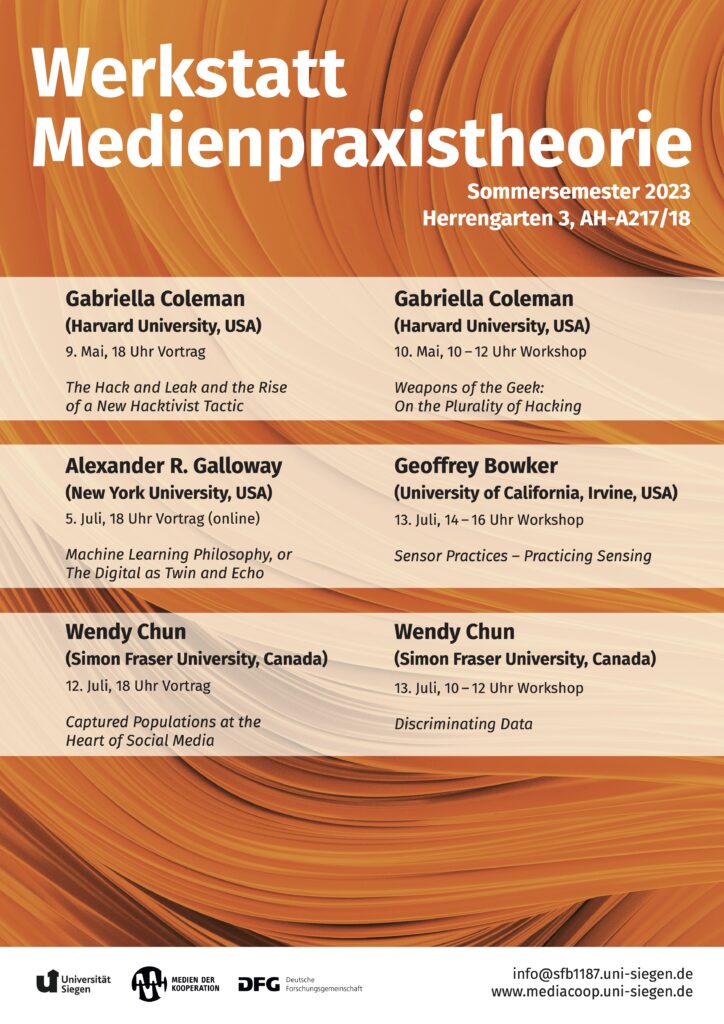
Lecture on 9th May – “The Hack and Leak and the Rise of a New Hacktivist Tactic“
Today, if the New York Times published an article covering how and why a hacktivist busted into a computer system, swiped data, and dumped it for the public at large, no one would bat an eye—the organization might even have used the email for some of their reporting. This tactic, however commonplace today, and used by hacktivist crew and nation-state alike, barely existed prior to 2011, even though hypothetically it could have, given existing technical and ideological conditions that had been around for at least a decade.
This talk will unveil the prehistory and history of the hack-and-leak tactic with a focus on material, infrastructural conditions, along with the prominent role played by the hacktivist collective Anonymous in popularizing what I argue is a novel tactic used only sparingly prior to the forceful appearance of the hacktivist wing around 2010. The hack-and-leak stabilized only in 2011, an exceptional year of political ferment characterized by waves of street-based demonstrations and the ascendancy of the hacker as a major geopolitical force. With Anonymous and WikiLeaks, hackers pushed the levers of power in new and far more consequential ways, making hack-and-leaks the stuff of foreign policy briefs and international relations debates. In this period, Anonymous hackers twice stumbled upon newsworthy documents that they then published on accessible platforms like the Pirate Bay or WikiLeaks. Their conspicuous brand of hacking—accompanied by catchy digital posters and videos—lured in media professionals who boosted Anonymous’s profile and by extension raised the profile of this mode of disclosure, ensuring that scattered instances of this method would crystallize into a template for emulation.
Workshop on 10th May – “Weapons of the Geek: On the Plurality of Hacking“
More information to follow.
More information to follow.
Lecture on 12th July – “Captured Populations at the Heart of Social Media“
Workshop on 13th July – “Discriminating Data“
More information to follow.
Workshop between 14:00 – 16:00
More information to follow.
Talks in the winter term 2022/23
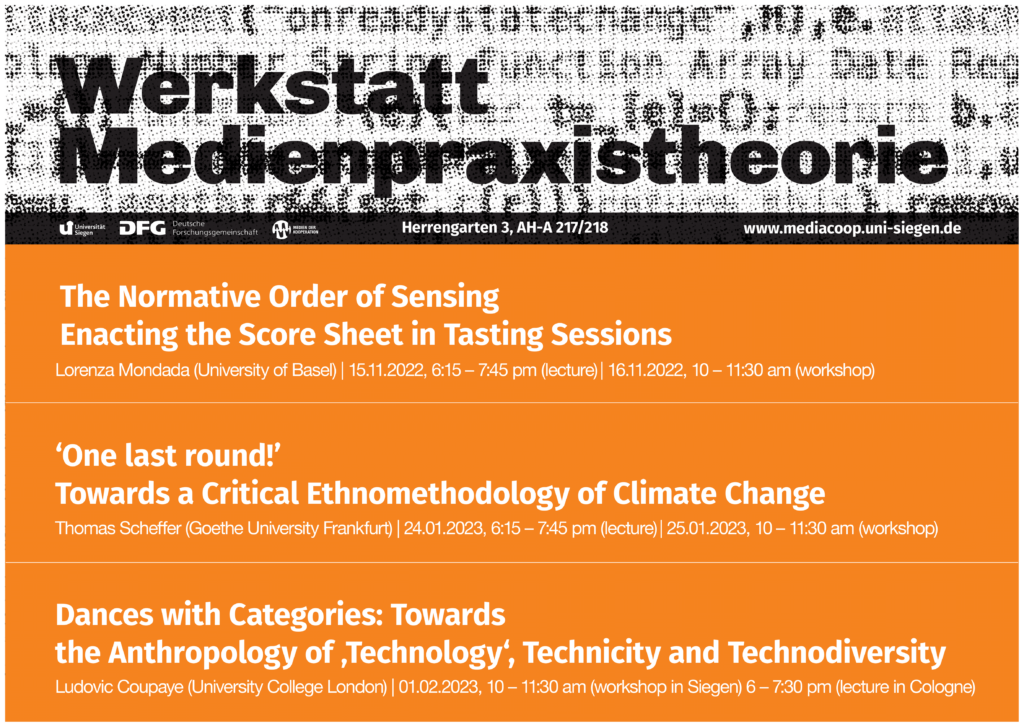
Tasting sessions represent a perspicuous setting for a praxeological approach of sensoriality: they are a social activity in which the senses and the sensorial features of objects are the main focus of the participants. Tasting sessions are an activity in which participants do not merely eat (Mondada in press, Fele 2019), do not just taste (without having to verbally express a judgment, contrary to other settings, Mondada 2021), but taste in order to precisely describe what they sense (Liberman 2013, 2018, Mondada 2020, 2022, in press, Mondada & Fele 2020), using specific repertoires of descriptors. Thus, the activity crucially articulates sensations and their linguistic expression. However, this activity is more than just the association of a sensing body and some language. It is a practical situated achievement that relies on a specific understanding of what sensoriality is, its relation to language and, crucially, its relation to culture, expertise, and institutionality — represented by the use of a range of semiotic and lexical tools (such as the Aroma wheel). These tools constrain the expression of sensoriality and authorize some descriptions, while discrediting others. In this way the senses are normatively disciplined. This paper shows how the body, materiality, language, and normative constrains are practically managed and bodily aligned by the participants of tasting sessions. In this way, it provides for an account of the sociality of the senses that does not rely on a global deterministic sociological account but on the subtle ways in which the senses are normatively disciplined within situated occasions of sensing.
The talk unfolds mundane events in the light of the members’ methodical responses to pressing tasks. It discusses the practical as well as analytical status of climate change as an omnipresent existential problem, questioning the reproduction of society. This is why the events implicate the sociologists in various membership categories: as bystander, participant, and contemporary.
Thomas Scheffer is professor for sociology with an emphasis on interpretative social research. He worked and published on asylum, law policing, political work, and, recently, on sociology and climate change. His research methods cover CA, MCA, studies of work, ethnography, and discourse analysis. He developed the trans-sequential analysis for linking events and processes of meaning production.
This lecture explores how “Technology” is a category vernacular (emic) to modernity which, when used, inscribes the phenomena it refers to within an utilitarian, rationalist and Eurocentric frame. Building on the works of the Francophone Technologie Culturelle, the paper suggests going back to Marcel Mauss’s definition of “technical acts”, focalising on the issue of “efficacy”. The paper claims that it is by taking seriously the efficacy according to the actors themselves, whether computer engineers, long yam growers or shamans, that one can built a methodological frame able to empirically analyse technical (or ritual or aesthetic) phenomena, and their profound axiological import, without sacrificing their material or conceptual diversity, or their spatial or temporal complexity. It opens up with a call for an anthropology of technicity and technodiversity which analyse the different modalities of actions and relations between humans and their milieus.
Talks in the summer term 2022
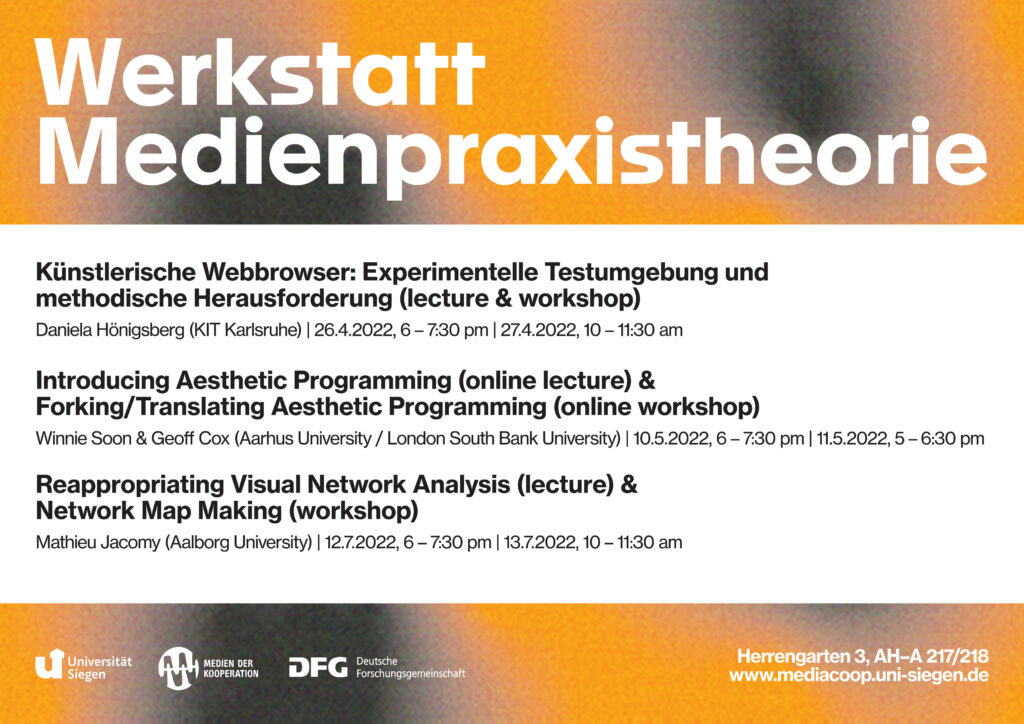
In der Informatik wird Quellcode traditionell entwickelt, getestet, überarbeitet. Es geht darum Projekte zu optimieren, zu bewerten, zu debuggen, weiterzuführen oder in andere Systeme zu migrieren. Die Formen der Analyse sind auf diese Kerninteressen hin angelegt. Disziplinen wie die Software Studies oder die Critical Code Studies schlagen einen anderen Zugang vor, der den Quellcode stärker in seinem soziokulturellen Umfeld verortet und untersucht. Das von mir vorgeschlagene Vorgehen bewegt sich methodisch in einem Zwischenraum dieser Zugänge und orientiert sich dabei an den Konzepten der visuellen Programmierung in Lernumgebungen wie Scratch. Denn was in Scratch z.B. zur Vermeidung von Syntaxfehlern der jungen ProgrammiererInnen dient, kann auch in der geisteswissenschaftlichen Untersuchung nutzbringend sein. Die farblichen Kategorien der Programmiersprache vereinfachen und markieren die unterschiedlichen Prozesse nicht nur syntaktisch, sie strukturieren und ordnen sie auch semantisch. Dies bietet einen quellcode-nahen Zugang zu künstlerischen Projekten, räumt jedoch ebenso die Möglichkeit ein auf die Prozesse zu fokussieren, die explizit die Nutzungserfahrung und das Nutzungsverhalten betreffen. Diese zwei Aspekte stehen im Zentrum vieler der untersuchten künstlerischen und experimentellen Anwendungen. Denn künstlerische Webbrowser verhandeln nicht nur Aspekte des Internets, die normalerweise unbemerkt bleiben indem sie einen alternativen Zugang zum Internet offerieren. Die KünstlerInnen widmen divergierenden Nutzungsangeboten in ihren Anwendungen, sowie visuellen, akustischen, räumlichen und zeitlichen Konfigurationen große Aufmerksamkeit. Mit der hier vorgestellten Methode möchte ich die künstlerischen Projekte als eine experimentelle Testumgebung für Nutzer:innenerlebnisse und Handlungsmöglichkeiten für Webbrowser in ihren technischen als auch systemischen Einbettungen darlegen.
Daniela Hönigsberg (M.A.) ist akademische Mitarbeiterin am Karlsruher Institut für Technologie im Fachbereich Kunstgeschichte, wo sie im Projekt „Browser Art. Navigieren mit Stil“ im Rahmen des DFG-Schwerpunktprogramms „Das digitale Bild“ forscht. Sie promoviert an der Technischen Universität Berlin zum Thema der Software als künstlerisches Material. Ihre Forschungsschwerpunkte liegen in computerbasierter Kunst der 1990er und frühen 2000er Jahre, Verflechtungen von Künsten und Wissenschaften sowie der Theorie der klassischen Moderne und frühen Nachkriegsmoderne.
After the launch of the Aesthetic Programming book, we have recently formed a small working group to translate it into Traditional Chinese language, working closely with Taiwanese art and coding communities. The politics of translation has been well-established in general, but what of the specifics of translating a book such as this? Can we think of forking as a kind of translation, and cultural translation in particular? In the forking of Aesthetic Programming, we are curious to consider translation at the various levels of socio-technical operation – recognizing the many layers of translation at work when machines interpret instructions in their own terms. But how do problems of translation resonate more broadly when translating a book about programming that requires precision of language that is both descriptive and active/executable? What are the implications of drawing forking and translating together?
Geoff Cox likes not to think of himself as an old white man from a parochial island but is clearly in denial. At least other aspects of his identity are thankfully more ambiguous and fluid. Research interests lie broadly across contemporary aesthetics, cultural theory, software studies, and image politics, reflected in his academic position as Professor and Co-Director of the Centre for the Study of the Networked Image at London South Bank University, UK, and Adjunct at Aarhus University, Denmark.
Winnie Soon was born and raised in Hong Kong, increasingly aware of, and confronting, identity politics regarding colonial legacy and postcolonial authoritarianism. As an artist-coder-researcher, they are interested in queering the intersections of technical and artistic practices as a feminist praxis, with works appearing in museums, galleries, festivals, distributed networks, papers and books. Researching in the areas of software studies and computational practices, they are currently Associate Professor at Aarhus University, Denmark.
This workshop about visual network analysis is open to all publics, with or without experience with the discipline. We will focus on the mechanics of reading a network map, and from there understand how to build them so that they are useful in practice. The workshop is mostly tool-agnostic, but we will use Gephi, a free network visualization tool, as our tool of choice, for those comfortable with it. We will also address the issue of building a narrative about a network, and how to mobilize the multiple layers of mediation involved, and notably the layout algorithm. Finally, we will engage with (and discuss) Gephisto, an experimental tool designed to produce network maps in one click (but with a catch!). This workshop will make it clear what to expect and not to expect of network maps, how to make them well, how to interpret them properly, and how to approach visual network analysis as an operational practice.
Mathieu Jacomy is post-doc at the TANT Lab in Copenhagen, and previously was research engineer at the Sciences Po médialab in Paris. Jacomy tweets at @jacomyma
Talks in the winter term 2021/22
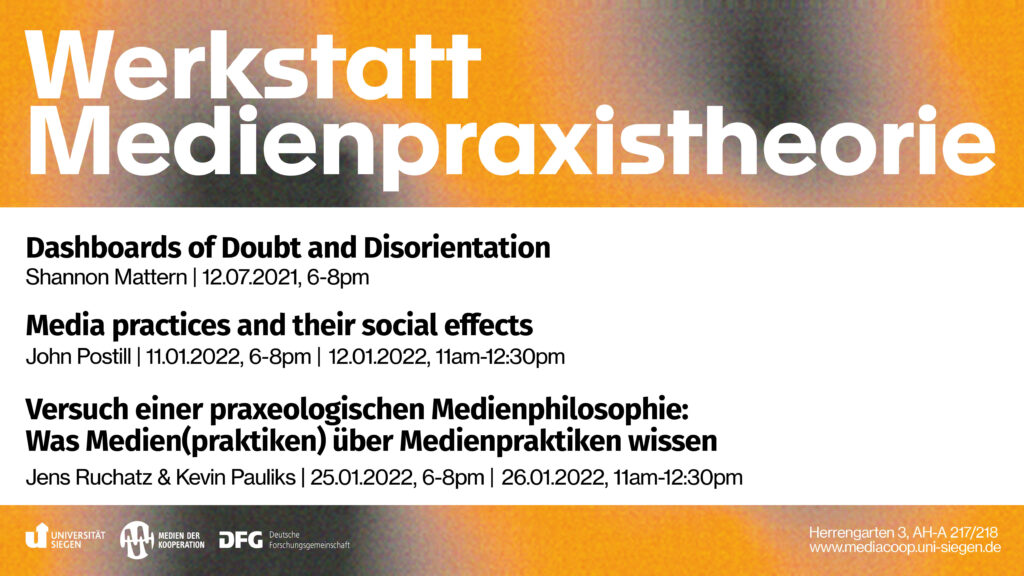
In this era of upheaval and uncertainty, data dashboards have proliferated, promising clarifying oversight of everything from COVID infections and vaccinations, to the removal of white supremacist and colonialist statuary, to energy expenditures and climate change mitigation efforts. Dashboards crystallize states’, municipalities’, activists’, and corporations’ approaches to epistemological and affective governance by parceling the knowledge required for decision-making and calibrating stakeholders’ panic and pride in “progress.” Yet for all their promises of omniscient command, dashboards also manifest doubt and disorientation. In this talk we’ll examine a variety of recent dashboard and “control center” projects – both functioning and speculative examples – and consider how they reveal, perhaps inadvertently, the uncertainty and ambiguity underlying the data that illuminate their screens, the intelligence they cultivate, and the modes of governance that intelligence ostensibly inspires.
Shannon Mattern is a Professor of Anthropology at the New School for Social Research. Her writing and teaching focus on archives, libraries, and other media spaces; media infrastructures; spatial epistemologies; and mediated sensation and exhibition. She is the author of The New Downtown Library: Designing with Communities; Deep Mapping the Media City; Code and Clay, Data and Dirt: 5000 Years of Urban Media, all published by University of Minnesota Press; and A City Is Not a Computer, published by Princeton University Press. She also contributes a regular long-form column about urban data and mediated infrastructures to Places Journal. In addition, she serves as president of the board of the Metropolitan New York Library Council and regularly collaborates on public design and interactive projects and exhibitions. You can find her at wordsinspace.net.
In this workshop we discuss John Postill’s lecture and forthcoming paper that draw from the practice theory and media anthropology literature, as well as from a range of empirical studies, including Postill’s own anthropological research in Malaysia and Spain, to discuss the effects of media-related practices in people’s social worlds. Postill argues that these social effects come in two main varieties – mediatising effects and worlding effects – and that this area is ripe for further media ethnographic work, so long as we overcome our customary aversion to the notion of media effects.
John Postill gained a PhD in Anthropology at University College London in 2000. He specialises in the study of media and sociocultural change and to date has done fieldwork in Malaysia, Indonesia and Spain. He currently lectures at the School of Media and Communication, RMIT University, Melbourne, where he was previously a Vice-Chancellor’s Senior Research Fellow. His publications include The Rise of Nerd Politics (2018), Digital Ethnography (2016), Localizing the Internet (2011), Theorising Media and Practice (2010) and Media and Nation Building (2006). He is presently researching the ‘anti-woke’ movement and writing his first novel, a work of social science fiction titled Life of Piñas. He occasionally (re)tweets as @JohnPostill.
Wie unsicher Bestimmungen sind, was ein Medium ausmacht, ist spätestens seit den Anfängen der Digitalisierung offensichtlich geworden. Zuvor gesteckte Mediengrenzen, wie z. B. von Fotografie, Film und Fernsehen, scheinen im medialen Raum des Digitalen zu verschwimmen. Deswegen wird immer häufiger der Blick von den medialen Formen und ihrer Prägekraft hin zu den Medienpraktiken verschoben, also auf das, was Menschen mit Medien machen. Als methodisches Rezept wird dann eine Ethnographie verordnet, die vorschreibt, Akteure bei ihrem Tun zu beobachten oder über ihr Tun zu befragen. Die formanalytischen Bezugspunkte der Medienwissenschaft – ihre eigenen Kompetenzen und Praktiken – werden von solchen non-representational methodologies konsequent ausgeklammert. Dem möchten wir entgegenhalten, dass Medien – im Sinne einer praxeologisch gewandten Medienphilosophie – nicht weniger verlässlich über ihre Praktiken Auskunft geben als Akteure. Wenn wir uns das Ziel setzen, Medien darauf hin zu befragen, was sie von ihren eigenen Medienpraktiken wissen, dann gewinnt dadurch zugleich auch die Bestimmung des Medialen an Kontur und Konkretion.
Jens Ruchatz ist Professor für Medienwissenschaft mit dem Schwerpunkt Audiovisuelle Transferprozesse an der Philipps-Universität Marburg und stellvertretender Sprecher der DFG-Forschungsgruppe (FOR2288) „Journalliteratur: Formatbedingungen, visuelles Design, Rezeptionskulturen“ an den Universitäten Bochum, Marburg und Köln. Er leitet die Forschungsprojekte „Fragmentwanderungen im Medienvergleich: Fotografien in Zeitschrift und Buch im 20. Jahrhundert“ und „Bildförmige Bildkritik in Sozialen Medien. Explizites und implizites Theoretisieren des digitalen Bildes“. Er forscht unter anderem zu Fotografie in all ihren Materialitäten, zur Medialität der Zeitschrift, zu kulinarischen Medien und Fernsehserien.
Kevin Pauliks, M.A. ist wissenschaftlicher Mitarbeiter im DFG-Forschungsprojekt „Bildförmige Bildkritik in Sozialen Medien. Explizites und implizites Theoretisieren des digitalen Bildes“ im Rahmen des Schwerpunktprogramms „Das digitale Bild“ an der Philipps-Universität Marburg. Zuvor arbeitete er an der Bergischen Universität Wuppertal am Lehrstuhl für Allgemeine Soziologie. Von 2011 bis 2016 studierte er an der Philipps-Universität Marburg Medienwissenschaft und Soziologie. Er promoviert zu den Medienpraktiken von Internet-Memes in der Werbung.
Talks in the summer term 2021
Building upon Haraway’s concept of situated knowledge and recent research on algorithmic bias, situated data analysis allows researchers to analyse how data is constructed, framed and processed for different audiences and purposes. Situated data analysis examines representations of data, like data visualisations, which are meant for humans, and operations with data, which occur when personal or aggregate data is processed algorithmically by machines, for instance to predict behaviour patterns, adjust services or recommend content. The continuum between representational and operational uses of data is connected to different power relationships between platforms, users and society, ranging from normative disciplinary power and technologies of the self to environmental power, a concept that has begun to be developed in analyses of digital media as a power that is embedded in the environment, making certain actions easier or more difficult, and thus remaining external to the subject, in contrast to disciplinary power which is internalised.
Jill Walker Rettberg is a professor of digital culture at the University of Bergen, and PI of the Machine Vision project. Her research focus is on self-representation online and on the cultural effects of machine vision. She is the author of Seeing Ourselves Through Technology: How We Use Selfies, Blogs and Wearable Devices to See and Shape Ourselves (Palsgrave 2014; print and open access) and Blogging (Polity Press 2014).
This lecture will be held in german.
Der Vortrag reflektiert den Beitrag des Praxisbegriffs zur Analyse digitaler Kultur. Hier stößt der Handlungsbegriff des methodologischen Individualismus mit seiner Verkürzung auf das rational handelnde und sinnstiftende Individuum angesichts komplexer Verkettungen menschlicher und nicht-menschlicher Elemente an seine Grenzen. Dagegen scheint sich der Praxisbegriff hervorragend auch auf nicht-menschliche Beteiligte wie Infrastrukturen, Software und Algorithmen beziehen zu lassen und findet in der Soziologie des Digitalen bereits Verwendung. So ist beispielsweise die Rede von algorithmic practices, data-driven practices, data practices oder digital practices. Der Praxisbegriff wird dabei jedoch bislang noch selten reflektiert geschweige denn voll ausgeschöpft.
Von „digitalen Praktiken“ lässt sich in einem dreifachen Sinne sprechen: In einer allgemeinen Verwendung handelt es sich zunächst um den Gebrauch digitaler Infrastrukturen und Programme, beispielsweise um die Navigation mit einem Kartendienst wie Google Maps im Stadtraum. Spezifischer lassen sich mit dem Begriff Praktiken bezeichnen, die nur in digitalen Umgebungen existieren, wie etwa das „Sharen“ von Inhalten im Web 2.0, das „Liken“ und „Retweeten“ in sozialen Medien oder das Erstellen von Memes, Mashups und Remixen. In einem starken Sinn schließlich gilt es zu reflektieren, ob das Prozessieren von Algorithmen selbst als eine Praxis bezeichnet werden kann. Diesen Fragen wird sich der Vortrag widmen.
Hilmar Schäfer ist Gastprofessor für Allgemeine Soziologie und Kultursoziologie am Institut für Sozialwissenschaften der Humboldt-Universität zu Berlin und Mitglied des Vorstands der Sektion Kultursoziologie der Deutschen Gesellschaft für Soziologie. Zu seinen Arbeitsschwerpunkten zählen soziologische Theorie, Kultursoziologie und Soziologie des Bewertens. Er forscht gegenwärtig zu den institutionellen und alltäglichen Prozessen der Konstruktion und Bewertung von kulturellem Erbe mit einem Schwerpunkt auf der Auszeichnung als UNESCO-Welterbe sowie zu digitalen Praktiken.
This talk unpacks the theory and practice of the ‘smart city’ by charting the way that techno-systems thinking shapes the way city systems are designed. From both “top down” and “bottom up”, technology companies, cash-strapped governments and enthusiastic tech-savvy activists have celebrated and legitimated thinking about optimizing and rendering more efficient ever more features of urban life. However, networking, reinterpreting data and sensing may also create spaces for collective voice and some novel forms of civic participation. By telling a history of smart city projects from the past 20 years, the talk provides new ways of seeing urban entanglements, looking at the frictions and tensions surrounding the development and management of data commons, and showing how the development of solidarity and acceptance of hybridizing knowledge can reinvigorate ways to live together.
Throughout the past twenty years a series of different technological frameworks have underpinned the desirability of optimization and narrowed the forms of idealized civic participation. Spreading sensor systems across cities makes surveillance cheaper and easier, and also normalizes and directs civic action towards ends that fit within overall frameworks of optimization. Undoing these dynamics requires an attention to friction and tension, as well as an attention to the potential other ways of understanding and connecting different forms of knowledge, including the datafied knowledge of sensing systems as well as other ways of knowing.
By learning from examples of ‘smart cities’ where data and knowledge unfold in tension, attending to the points at which human and biological knowledge disrupts and restructures technical knowledge, different ethics may be foregrounded, from hybridized knowledges negotiated around unstable data commons, to urban systems based on principles of ‘minimum viable datafication’. This paper explores how knowledge in a series of ‘smart city’ projects exceeds what can be optimized, from sensor systems that fail (but succeed in revealing living knowledge) to social movements like Extinction Rebellion and Black Lives matter that exceed the capacity of the optimized city. Optimization can narrow the frameworks for civic action in cities to align with technosocial systems and commercial expectations. Its undoing promises a more contingent acknowledgement of urban relationships, intelligence and persistence.
Alison Powell is Associate Professor in Media and Communications at the London School of Economics. She directs the JUST AI Network: Joining Up Society and Technology for AI, which is supported by the AHRC and in partnership with the Ada Lovelace Institute. Her research examines how people’s values influence the way technology is built, and how ethics in practice unfolds in technology design contexts. Alison’s work on open source projects, open hardware products and community-based innovation has spanned the past fifteen years and her book Undoing Optimization: Civic Action and Smart Cities is published by Yale University Press. This book identifies how citizens engage with the promise of smart cities, and suggests that integrated and systems-based thinking is required to enhance the ethical potential of civic action using technology.
Her previous projects include the Horizon 2020-funded VIRT-EU, which examined ways to explore ethics in practice among Internet of Things developer communities and responsible innovation, and Understanding Automated Decisions, which considered the possibility and consequences of explaining how algorithms work. Alison also shares her insights about how people make knowledge about the city through ‘data walking’ – see www.datawalking.uk – and her public writing at http://www.alisonpowell.ca.
This lecture will be held in german.
Wie kann man die wissenschaftlichen Praktiken der Künstlichen Intelligenz (KI) ethnographisch erforschen? Wie greifen Ansätze der KI in die empirischen Verfahren der Wissenschaften ein? Wie kann man den methodischen Einsatz von KI als Medienpraxis untersuchen? Diesen Fragen und ihrem Zusammenhang möchte ich im Rahmen meines Beitrags aus medienpraxistheoretischer Perspektive nachgehen.
PD Dr. Andreas Sudmann vertritt seit dem WS 2020/21 an der Universität Regensburg die Professur „Dynamiken virtueller Kommunikationsräume“. Ferner ist er Koordinator des durch die VW Stiftung geförderten Forschungverbunds „How is AI Changing Science? Research in the Era of Learning Algorithms“ (gemeinsam mit Anna Echterhölter, Jens Schröter, Alexander Waibel) sowie Leiter des seit 2019 geförderten DFG-Projekts „Medien und Infrastrukturen der Künstlichen Intelligenz. Computer Vision, Transfer Learning und Künstliche Neuronale Netzwerke als Black Box“. Aktuelle Publikationen: Games & AI (Special Issue of Eludamos, Vol. 10, No. 1 (2019), als Hg., gemeinsam mit Mathias Fuchs), The Democratization of Artificial Intelligence. Net Politics in the Era of Learning Algorithms (Transcript/ Columbia UP 2019, als Hg.), Machine Learning. Medien, Infrastrukturen und Technologien der Künstlichen Intelligenz (Transcript 2018, als Hg. gemeinsam mit Christoph Engemann), Serielle Überbietung. Zur televisuellen Ästhetik und Philosophie exponierter Steigerungen (Metzler 2017, zugleich Habilitationsschrift, Ruhr-Universität Bochum).